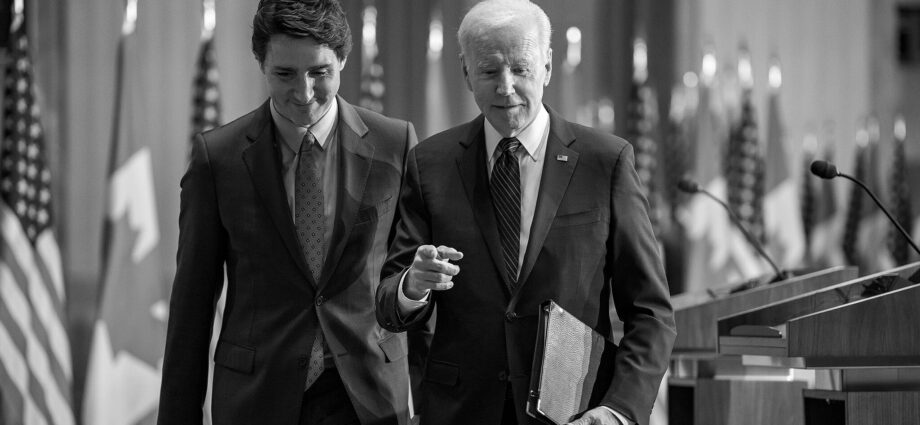
Thomas Klassen, York University, Canada
July 1, 2024
As Canadians celebrate the anniversary of the founding of their country on Monday and Americans observe the anniversary of the Declaration of Independence on July 4, the leaders of both nations are facing calls to resign.
In Canada, the unexpected loss of a Liberal Party stronghold in a Toronto byelection last week has raised calls by party members for Prime Minister Justin Trudeau to leave office.
In the United States, President Joe Biden gave a spectacularly poor performance in the June 27 televised debate with Republican challenger Donald Trump that has Democrats questioning their leader’s ability to secure victory in this November’s election.
A unique moment
The result is a unique moment in North America as the Canadian prime minister and the American president reflect on whether they should step aside for the betterment of their parties and their countries.
In less than two months, Trudeau will become the seventh-longest serving prime minister of the 23 people who have held the position. If he remains prime minister for another year, he surpasses Stephen Harper’s time in office.
At age 52, Trudeau is young compared to past prime ministers or current world leaders. Voters are troubled by the length of his time in office (more than 3,100 days) rather than his age. In contrast, it’s Biden’s age that’s troubling Americans.
Very few U.S. presidents have not sought a second term — the last was Lyndon Johnson, who surprised even his closest aides when he announced in March of 1968 that he wouldn’t seek re-election. However, Biden’s decision to run again is quixotic. When he became president at age 78, he was the oldest person (by eight years) to assume the office. He would be 82 at the start of his second term.
No mandatory retirement
Elected officials do not have mandatory retirement ages, unlike, for example, justices of the Supreme Court of Canada who must retire at age 75. Nor do politicians face fitness tests to determine their suitability for office.
Trump, who is only three years younger than his opponent, has called for Biden to be tested for drugs and to take a cognitive test.
Politicians of all stripes come to believe they are essential to their countries and citizens. Many major world leaders are in their 70s with a decade or more in power: Vladimir Putin (25 years), Xí Jìnpíng (11 years) and Narendra Modi (10 years). None plans to retire. Remaining in office allows them to protect their legacies and advance their priorities.
There are few mechanisms to remove an incumbent party leader in Canada or the United States.
Individual Liberals may suggest or demand that Trudeau resign, but that has no bearing unless it turns into groundswell among Liberal MPs and party members. Maverick Liberal MP Wayne Long’s call for Trudeau to resign is not (yet) a sign of a caucus revolt that would push Trudeau to depart.
There is recent precedent for a long-serving Liberal prime minister being pushed out by his party: Paul Martin did so to Jean Chretien in 2002. But this occurred only after Martin had spent a decade building his base of support within the Liberal party and caucus. There is no obvious challenger or successor to Trudeau with the stature of political capital that Martin had in 2002.
In the U.S. the situation is different. Kamala Harris automatically becomes president if Biden resigns while in office. This happened in 1974 when Richard Nixon, in the midst of the Watergate scandal, resigned during his second term and Vice-President Gerald Ford immediately took his place.
If Biden won’t run, what then?
If Biden decides he won’t run again but will stay in office until the end of his term, Democrats would then need to choose a new candidate to run against Trump. That would throw open the party’s convention which will be held in Chicago in August.
However, this scenario seems unlikely. Since the debate, Biden has said he intends to stay in the race. In the absence of a groundswell of opposition from Democratic leaders, Biden can make his own choices. Having decided a year ago to stand for a second term, he is not likely to reverse that decision after one poor debate performance.
In both Canada and the United States, there is a tradition of supporting the party and its leader. Political parties need to display a united front to win elections. A last-minute change of a leader before an election — although exciting for political commentators — creates uncertainty for organizations that are inherently conservative.
For now, Trudeau and Biden will join their citizens in celebrating their countries’ respective July holidays. But both will also be contemplating their futures. As veteran politicians, they know how quickly the political winds can shift.
Thomas Klassen, Professor, School of Public Policy and Administration, York University, Canada
Subscribe to our newsletter.
This article is republished from The Conversation under a Creative Commons license. Read the original article.


